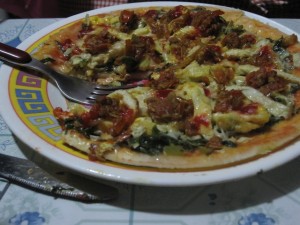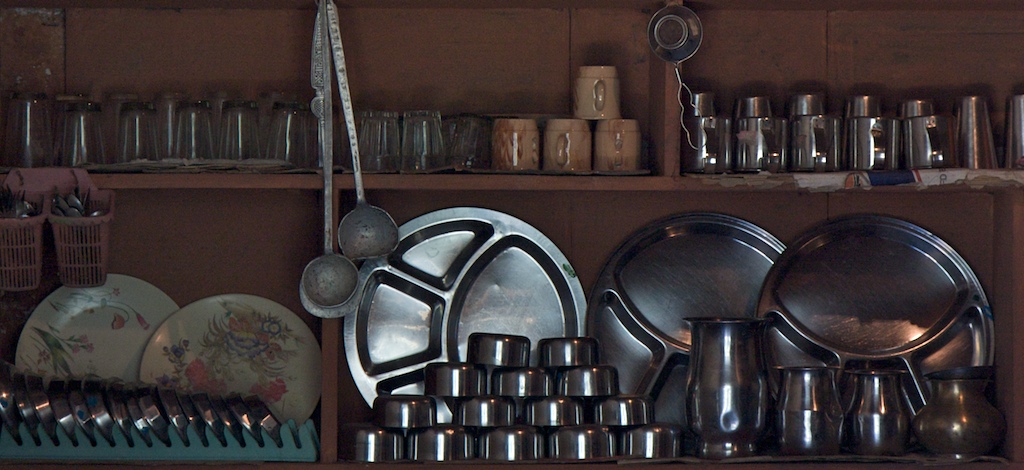
Tiger Balm Tales Vol 16
Carbo Loading
Whoever said carbs aren’t good for you never hiked in Nepal. When hiking for 2 weeks, carbs become your ally. This is probably the one time when you can get away with eating carbs at every meal, so my best advice is – enjoy the hell out of it.
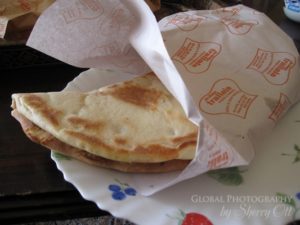
I can’t say the food was spectacular on the Annapurna Circuit, in fact I actually lost weight on the 21 day hike! However, the variety of food produced out of a kitchen with a log flame for a stove was amazing. Given the inherent challenges with getting food supplies to high altitude villages via donkey, the guesthouses did a good job of putting together a western friendly menu. I recently heard from a reader, Jay, about his experiences on the Annapurna Circuit in 1983 – when western type menus didn’t exist on the circuit! It was dhal bhat every day for Jay!
The western food choices were everywhere; Yak steak in Manang, apple pie in Marpha, pizza in Dharapani, and pancakes in Pisang. However these familiar names didn’t always have a familiar look. It was the Nepalese take on these western staples. They did they best they could given the ingredients they had to work with. I quickly learned to not set my expectations very high and accept anything that was put in front of me! I was thankful I had some western options. Granted, those options were the exact same everywhere with subtle differences. At any guesthouse you could expect the choices to fall into one of these menu categories:
Potato Dishes
Noodle Dishes
Rice Dishes
Soup Dishes
Bread Dishes
Dhal Bhat Dishes
Egg /Porridge Dishes
Hot Drinks
Cold DrinksMmmm——Carbs!
Dhal Bhat Power 24 Hour:
The local dish of Dhal Bhat (beans, rice, & vegetable curry) was one of my favorite things to order. It always tasted good – but more importantly you received free refills of any food item in the Dhal Bhat platter. Dhal Bhat is served on little metal trays that look like frozen TV dinner trays. Each item had it’s own little compartmentalized area on the plate. Apparently Nepalese aren’t fond of their food touching.
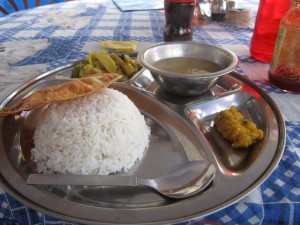
Once given the plate full of rice and a soupy bean mixture you poured the soupy beans over the rice, and scooped up the hot mixture with your hands. Traditionally the Nepalese don’t use utensils. They have a whole process of holding their fingers in such a way that they could shovel large amounts of food into their mouth with one hand. I was always in awe of this ability. My Dad even gave it a go without utensils once. He did pretty well in my standards, but he was basically entertainment for the locals who tried to stifle laughter.
When you ran low on rice or beans, someone would come over to the table with a big bowl and ladle and give you more. It was as if the all you can eat buffet came to you; you didn’t even have to go to the effort to get up and walk over to a buffet. However, in Kathmandu you were treated to a ‘fancier’ version of Dhal Bhat which included many more little bowls of veggies and beans including a homemade yogurt to ease the spiciness of the curry.
Dhal Bhat was the perfect food for trekking – the guides and porters ate Dhal Bhat 2 times a day every day; providing them energy for the day to carry heavy loads and deal with foreigners!
Pasta Nepalese Style:
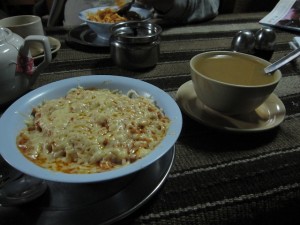
Every time I sat down to eat at a guest house, it was as if I had sauntered up to the blackjack table at Caesars Palace; it was a gamble. You try the spaghetti at one place and it’s good, but then you try it again a couple of guest houses later and it’s completely different. You learn to look at food not as an experience, but as nutrition. This can be a hard transition to make sometimes for tourists who treat eating as a overall experience of presentation, smell, and taste. Many times the spaghetti on the menu was simply noodles with ketchup. Or the cheese macaroni was really just macaroni noodles with a ‘sheet’ of hard melted cheese over the top that didn’t really stick to the macaroni at all because the guesthouses were so cold!
We quickly came to learn that Nepalese lasagna was not at all like our version of lasagna made of layered pasta, sauce, and cheese. On the Annapurna circuit lasagna meant fettuccine noodles served on a hot skillet with meat, veggies and cheese stir fried in. All the same ingredients in a way – but a different presentation.
Hot Beer and Cold Showers – Drinks:
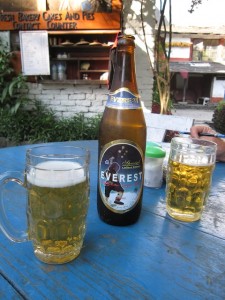
Inevitably the beer was always hot and the showers always cold – but at least it was predictable…and the beer ALWAYS tasted good after hiking all day! Some guesthouses would even serve popcorn as appetizers! The usual beer of choice was the local beer – Everest. However the cheaper version of alcohol came in the form of moonshine called Roxy. It was cheap and potent, but it worked faster than Advil when it came to taking away my hiking aches and pains.
The main non-alcholic drink was tea. Milk tea, masala tea, and lemon tea seemed to be the favorites. We’d get a extra large thermos of tea at night and keep it in our room to have a hot drink in the morning when we got up and started packing . I also tried the infamous seabuckthorn juice along the trail. Neon orange in color, seabuckthorn juice is made from small berries and was similar to orange juice.
A Sweet Tooth
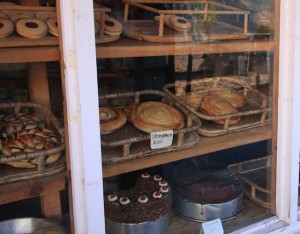
The joy of hiking 7 hours a day – you can always have dessert. Someone in Nepal learned that foreigners love sweets – specifically sweets made of bread. When you think about the Himalayas you naturally think cinnamon rolls – right? Nearly every village had a bakery; and I think we visited nearly every bakery! In fact, Dad and I had our share of cinnamon rolls with beer chasers. Don’t cringe until you’ve tried it! In addition to cinnamon rolls, there were other baked goods such as apple pie, chocolate cake, and rice pudding.
Most importantly, we never went hungry on the Annapurna Circuit. I was really surprised with the variety of food choices on the circuit; there’s really no reason why you’d have to bring your own snacks along as the guesthouses along the circuit have plenty to keep you energized. Save space in your pack, support the local guesthouses and bakeries along the way. They exist there for you, the trekkers; the locals certainly aren’t eating at these establishments! Considering how far along food has evolved since Jay trekked in 1983, I can only imagine that when I go back again, they’ll be serving coq au vin and ice cream parlors will dot the trail!
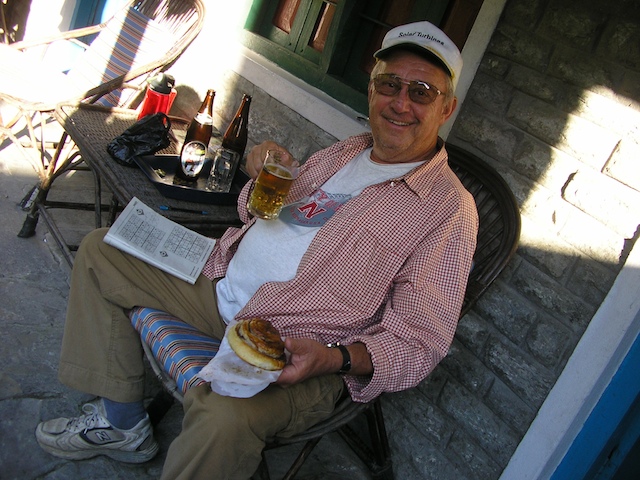

Sherry Ott is a refugee from corporate IT who is now a long term traveler, blogger, and photographer. She’s a co-founder of Briefcasetobackpack.com, a website offering career break travel inspiration and advice.
Additionally, she runs an around the world travel blog writing about her travel and expat adventures at Ottsworld.com.com.

